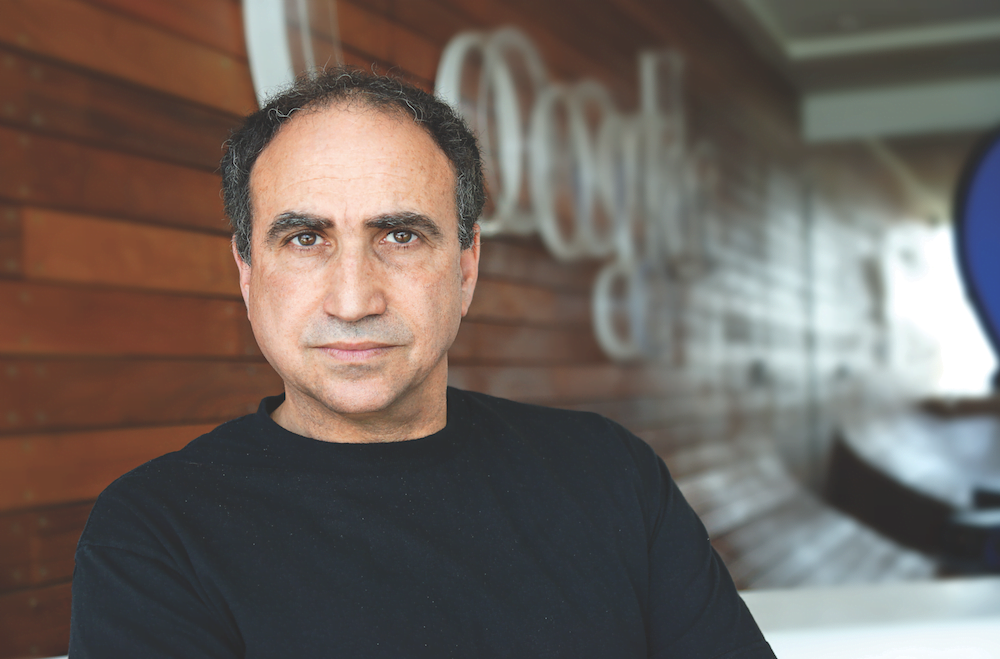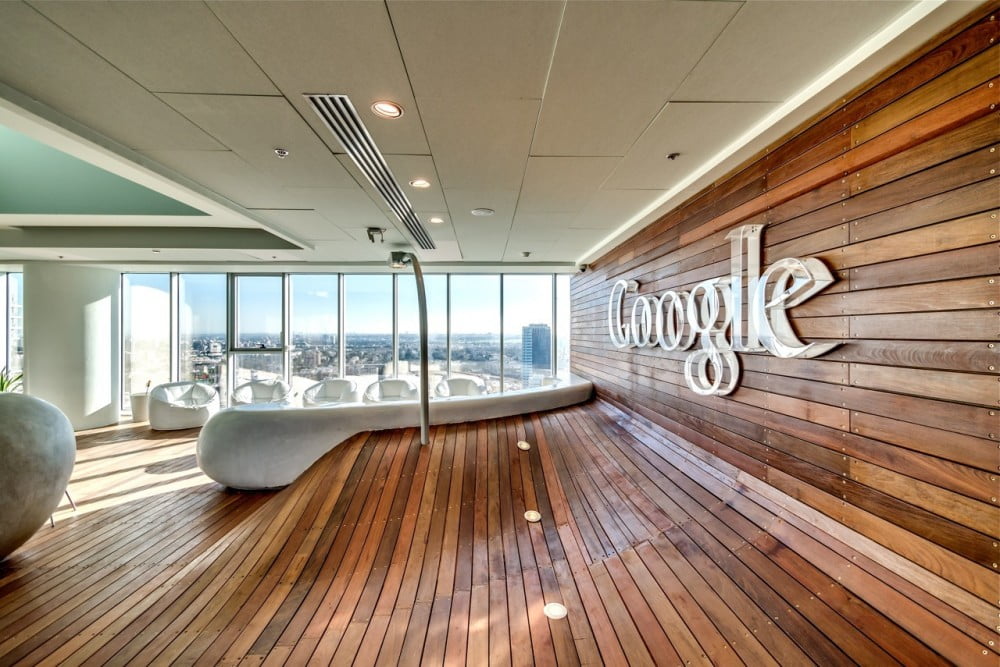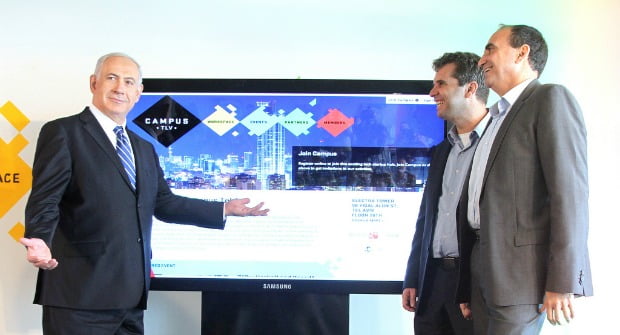You know that function on Google Search that finishes your sentences for you? Or what about the helpful information boxes that you often see at the top of a search inquiry? These central features of Google’s most valuable offering have helped the Internet giant beat out other worthy competitors, like Yahoo and Bing, and continuously do their share to make information more accessible.
What you may not know is ‘Live Results’ (autocomplete in search), Google Trends, and a number of other features on Google were developed in Israel under the supervision of global Google VP of Search Yossi Matias. Tasked with establishing one of Google’s first research and development centers outside of the United States in 2006, Matias has been responsible for directing the Israeli R&D center towards stunning achievements and technological breakthroughs in the realms of search, and big data, as well as initiating impressive cultural entrepreneurship programs that too have “gone global”. In an exclusive interview with NoCamels, Matias paints a picture of just how important a member Google Israel has become in the company’s global family, and offers up his assessments on where the future of Israeli entrepreneurship is heading.
Product of the “idea factory”
Sitting down with Matias at Google’s Tel Aviv offices, he starts off the interview with the rather broad statement: “I have always sought to combine scientific research and technological entrepreneurship.” Though I frantically wrote it down, on second thought I wasn’t convinced that I totally understood what Matias was referring to. However, at the end of our hour-long conversation, his adage became clear.
Matias began his career as a research scientist after receiving his doctorate in computer science at Tel Aviv University, setting off almost immediately to become part of one of the first “idea factories” at Bell Labs in New Jersey. What Matias calls “the place were innovation was born,” Bell Labs has produced work that has led to eight Nobel prizes and was the workplace of the likes of Google exec Eric Schmidt, computer science pioneer Richard Hamming, and Gordon Gould, the man to receive the first patent for a laser. It was there that Matias was able to become a big part of the first research into “big data,” or the act of processing huge databases of information into tangible figures, winning him and his partners the prestigious Gödel Prize in Computer Science in 2005.
SEE ALSO: Check Out Google’s Awesome New Tel Aviv Offices!
After co-founding his very own startup Zapper Technologies and joining enterprise software company HyperRoll, which was acquired by software giant Oracle in 2009, Matias received a call from Google tasking him with the establishment of an R&D center in Israel. “Even then, Israel was high up on the list for Google in terms of founding a research and development center. However, I still had two questions for the company before I committed to joining. The first was, ‘Why in Israel?’ and the second was ‘What would you like us to build here?’” According to Matias, the answer he received to the first question was a complement to Israel’s entrepreneurial flavor, similar to the arguments presented by Saul Singer in his book “The Startup Nation,” while the answer to the second was much more vague, along the lines of ‘We’d like you to figure it out’.
“The latter statement really describes that period at Google,” Matias accounts. “Eight years ago Google was a much younger company and there were a good many experiments into different sectors. Today, the strategic decisions on what we want to build and how are more organized and structured as part of our organization.” Brin and Page gave Matias a lot of responsibility in establishing an Israeli R&D center, and combining its two centers in Tel Aviv and Haifa, which may be the reason that the Israeli office tends to soar beyond others in terms of its role in Google’s core innovation.
Google Israel: The masters of search
Asked to explain some of the things that Google Israel’s offices are responsible for, the list pans out to be surprisingly long. “Israel has become one of the fastest growing centers in all of Google, now reaching the order of some 500 or so engineers alone, and one of the biggest areas we specialize in is search.” Anyone who has ever used Google (or the Internet) knows that search is what Google does best, and you may be asking – ‘what remains to be improved?’ – but as Matias and the team at Google Israel see it, there is still plenty work to be done. “I literally got this kind of question all the time back in 2006 because people said, ‘Well, I search for stuff and it’s better than I ever remember search being.’ However, this statement is rather naïve because in the past couple of years we have seen some of the most dramatic changes to search.”
The constant strive to improve the ease of access to information as well as the intelligence of search commands is what drives Google Israel towards international recognition and success. Google’s Israeli engineers developed the ‘autocomplete’ function for inquiries, YouTube videos, images and more, a feature that we use and take for granted on a daily basis. The team is also working hard to improve search on mobile, with Matias showing me one such feature; the ability to search for and purchase things like movie tickets by simply talking to Google Search. Other features developed in Israel include webmaster tools designed to improve the relationship between the world’s number one search engine and website owners, Google Trends, a project to track “viral” search words on the Internet, and features based on the Knowledge Graph, or a global initiative to give us a better understanding of the world at a semantic level, providing more intelligent answers to the questions we ask. The latter feature may be familiar to you from events like the World Cup, when Google displayed the game scheduling information according to a user’s location, or the currency conversion services that eliminate the need to hop from one website to another in order to find the right conversion rates.
Sign up for our free weekly newsletter
SubscribeAs Matias sees it, these impressive accomplishments are only a small piece of the pie, “Really, the ultimate goal of search, despite all of the progress we have, is still ahead of us. It’s no longer the case of collecting information – you want to get your information and get things done, simultaneously.”
This keen understanding about the current state and future of search, which Matias repeats is all about getting stuff done on mobile, is what won him the prestigious position of VP of Search in the company in December 2014, “This is recognition of the fact that some of the work done by teams here in Israel is central and strategic to what is being done at Google,” Matias says with pride and striking modesty.
Raising Google’s social, cultural impact
When Matias isn’t busy trying to figure out how to answer all of our questions, he deals with important aspects of the Internet ecosystem: Internet privacy and engaging minority entrepreneurs. One of the earliest researchers to study the implications of the Internet on our privacy, a sensitive topic that often comes knocking at Google’s doorstep, Matias believes that we must remain active in ensuring that our information is secure. “I think that a major point here is that as a society, we need to adapt to technology. One of the most obvious challenges in this realm is developing technologies that help protect user privacy while maintaining technological innovativeness,” he says.
In addition to keeping our information safe, the Israeli team has initiated a number of impressive cultural engagement projects that have since gone global (within Google, that is).” One of the programs that began at Google Israel is called ‘Mind the Gap,’ an initiative to get more girls and women involved in tech and computer science by showing them that women play a crucial role in Google’s team. “The hypothesis going in was that much of the problem is one of perception, that if you can really change the perception of girls at that age to show them that technology is suitable for them, then you can make a difference in the future,” says Matias of the program originally proposed by two female engineers at Google Israel. According to Matias, the program has seen about 6,000 girls come through its doors since it began six years ago and has since spread to other Google offices in Poland, Tokyo and New York.
Another interesting project that began at Google Israel is called ‘Campus for Moms,’ which is all about keeping new moms and women on maternity leave busy and active in the high tech space. The initiative was sprung from another to get more minorities, particularly Arabs and orthodox Jews, more involved in tech through the Campus TLV, a mentorship program for young startups that started off by chance. Two years, 900 events and 60,000 participants later, Google Israel’s Campus TLV program succeeded in winning over global Google, and the ‘LaunchPad’ section of Campus TLV, an opportunity to connect early-stage startups with mentors, is now active in at least five other countries.
SEE ALSO: The Other Silicon Valley: The Role Of Multinational Companies In Israel’s Startup Ecosystem
And the buck doesn’t stop there – Google Israel has played a central role in the development of one of Google’s most profound programs, the Cultural Heritage Program. Launched by Google in 2011 as the Google Art Project (though it was developed in Israel beforehand), the goal of the program was to put art exhibits and other cultural information online to educate and inspire future generations. Google Israel contributed to the project by taking over 130,000 images and documents from the Holocaust Museum in Israel (known as Yad Ve’Shem) and putting them online, later to be followed by an ambitious project to put the five Dead Sea Scrolls online, as well as the Nelson Mandela archive. According to Matias, the archives project “has become one of the main pillars for the Google Cultural Institute in Paris,” setting off what is now known as the Collections Project to bring archives online.
Adopting the global perspective
Now getting back to the connection between scientific research and innovation, a relationship that Matias seems to think will drive the future of technology. “One of the things that I have discovered over the years was that technologies could be built based on theories and research questions, and I discovered that research could be used to discover and think up new technologies.” He adds: “The opportunity to have impact on the end user in the development of technologies is now greater than any time that I can remember.”
Related posts

Editors’ & Readers’ Choice: 10 Favorite NoCamels Articles

Forward Facing: What Does The Future Hold For Israeli High-Tech?

Impact Innovation: Israeli Startups That Could Shape Our Future








Facebook comments